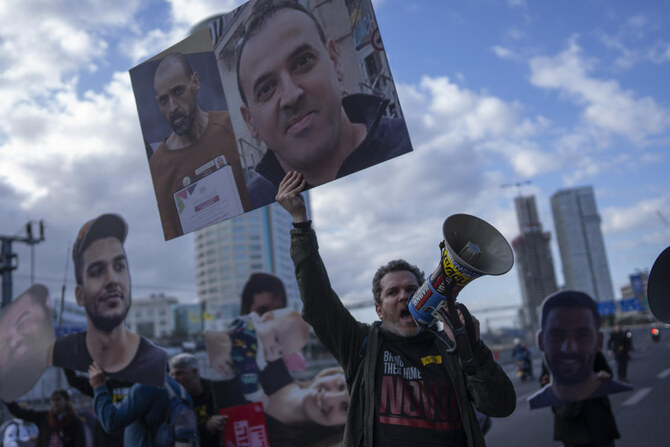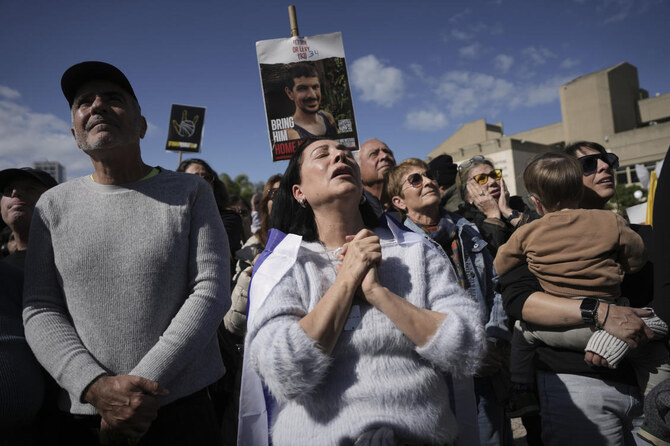RAMAT GAN, Israel: After 484 days of captivity in Gaza, Keith Siegel had many questions. Was his 97-year-old mother still alive? Which of his neighbors was killed in Hamas’ Oct. 7, 2023, attack? Why did it take so long to free him?
With minimal access to media, the dual American-Israeli citizen only learned months after he was captured that his son had survived the attack that launched the war in Gaza. He had heard that his family and others’ were advocating for hostages’ freedom. But beyond that, he knew very little about life outside his confines in Gaza.
“He really wanted to know everything as soon as possible, just to put all the question marks away and to know what happened,” said his daughter, Elan Siegel.
Hostages freed as part of a tenuous ceasefire in Gaza are confronting a flood of information about loved ones and destroyed communities, and are still figuring out their place in a changed world. Their families are grappling with how to fill them in on what they missed without potentially deepening their trauma.
Experts say it is important to be cautious.
“The information is definitely traumatic so you have to really be sensitive, careful and monitor the pace in which you expose the information,” said Einat Yehene, who heads the rehabilitation division at the Hostages and Missing Families Forum.
Paraded by Hamas, then by shattered reality
For many freed captives, catching up has been excruciating.
Eli Sharabi, 52, had no exposure to media during his 16-month ordeal, according to his brother, Sharon Sharabi.
Forced to speak at a staged Hamas ceremony before his release, a gaunt Sharabi told a crowd of masked militants and journalists that he was looking forward to seeing his wife and two teenage daughters back in Israel.
Then he learned the crushing reality shortly after his arrival in Israel: all three had been killed at home during the Oct. 7 attack.
“Beyond the emotional burden and difficult experiences he faced in captivity, he had to bear this horrible loss on the first day that he left from there,” his brother told Israeli Army Radio.
Or Levy, 34, was dealt a similar blow upon being freed. That is when he learned that his wife, Einav, was killed on Oct. 7.
“For 491 days, he held onto hope that he would return to her,” his brother, Michael Levy, told reporters.
Levy was reunited with his young son, who hit key developmental milestones, like being potty trained, while his father was in captivity. “It took you a long time to come back,” the 3-year-old told his father, according to Israeli media.
Facing uncertainty even after being freed
The first person Keith Siegel asked about upon returning home was his mother, Gladys. When his wife’s eyes welled up, he immediately understood she had died, his daughter recounted.
Siegel picked up some information about his family while in captivity. Months into the war, he heard his daughter on the radio, speaking about how his son had survived Hamas’ attack. Other freed hostages have also reported hearing messages from their families through the news media.
Yarden Bibas, who was freed earlier this month, was told by his captors that his wife, Shiri, and their two young sons, Ariel and Kfir, were dead. But he was also told they were spotted in Tel Aviv, according to Israeli media.
Now that he is out, he still lacks clarity. They remain in Gaza, and the Israeli government has said it has “serious concern” for their lives.
A relentless need to know more
Beyond their personal lives, freed hostages are also taking in more than a year’s worth of world events: President Donald Trump is back in the White House; Israel and Iran engaged in their first direct attacks; Israel killed the longtime chief of the militant group Hezbollah, Hassan Nasrallah.
Keith Siegel’s family is sharing information sparingly, as one might with a child. “You answer only what he asks and not more than that,” his daughter, Elan, said.
But the questions are relentless.
Siegel wanted to know what happened to his community of Kfar Aza. Was anyone watering the plants? Who was killed in Hamas’ attack?
“We asked him if he’s sure that he’s ready. And he said ‘yes,’ that he just wants to know. So I read him the list of 64 people” who were killed, his daughter said. She said his reaction to the news has been muted because “it’s almost like he forgot how to feel” while in captivity.
Siegel’s photo has been a mainstay at protests and on banners highlighting the plight of hostages, making him recognizable across Israel. Ahead of his release, dozens of Israelis posted videos of themselves on social media making his favorite pancake recipe.
Siegel’s wife, Aviva, who was freed from captivity in the early weeks of the war, prepared a book for him that includes notes from the important figures she had lobbied on his behalf — from Israeli Prime Minister Benjamin Netanyahu to former US President Joe Biden.
Siegel was especially befuddled by the revelation that world leaders knew about his captivity.
His daughter, Elan, recalled him saying: “If they knew, how can it be that I was there for so long?”
Hostages freed from Gaza painfully piece together a changed world
https://arab.news/vunn6
Hostages freed from Gaza painfully piece together a changed world

- Hostages freed as part of a tenuous ceasefire in Gaza are confronting a flood of information about loved ones and destroyed communities
- Their families are grappling with how to fill them in on what they missed without potentially deepening their trauma
Military coalition in Yemen condemns attack on commander’s convoy

- Al-Maliki also said the coalition is committed to supporting Yemeni security efforts and pursuing those involved in the attack and bringing them to justice
RIYADH: The Coalition to Support Legitimacy in Yemen condemned on Wednesday an attack that targeted the convoy of a senior commander.
The attack in the Jaoula area of Lahj governorate targeted vehicles under the command of Brigadier General Hamdi Shukri, who heads the second division of the Giants Forces.
Coalition spokesman Major General Turki Al-Maliki said there were numerous deaths injuries and called the ambush “a criminal act that is contrary to all human and moral values.”
He said the coalition, which includes Saudi Arabia, will continue coordinating with the relevant authorities to ensure the security of citizens and maintain stability, Saudi Press Agency reported.
He called for people to work with the Yemeni government and military authorities to confront any sabotage attempts or terrorist operations targeting the security and stability of liberated governorates.
Al-Maliki also said the coalition is committed to supporting Yemeni security efforts and pursuing those involved in the attack and bringing them to justice.















